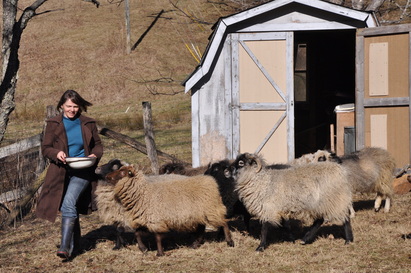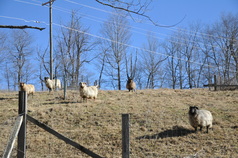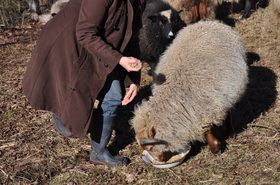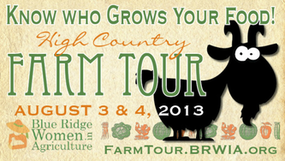Describe what you do on your farm: We live on four acres, one acre has the house, one has the flat garden area and then we have a two-acre hill. When we moved in we were more excited about the property than the house because it’s perfect for having a garden and I had always wanted to keep goats or sheep. We always knew we would have animals up on the hill one day even though there was no fence when we moved in. We eventually got sheep a few years after we settled in and we use them mainly for pasture maintenance and fiber, no meat production yet. We grow lots of fava beans, garlic, snow peas and flowers. We raise chickens mostly for the eggs but we processed our first chicken recently so that may be something we continue to do. At this point we’re really just doing it for ourselves but eventually we may start growing things to sell. The hill behind our house used to be an orchard so we’ve been slowly accumulating fruit trees with the intent of restoring that area to it’s former glory. I’m sure that when the trees start producing we’ll have more fruit than we could ever eat ourselves. What is your background? Have you always been in a food or Agriculture-related profession?I’ve always been interested in animals and I studied animal behavior in graduate school. A dear aunt of mine introduced me to gardening as a youngster and I’ve been hooked ever since. Although I’m only a few generations removed from full-time farming, I don’t have any farming experience myself. It seems like a leap for me to ever consider doing it professionally. I love the aesthetic qualities of growing food as much as the practical aspects of it. What do you see as some of the biggest challenges to your ideal ‘picture of agriculture’ in this area? Without a doubt, I think land development is the number one obstacle for new farmers. The price of land in this region is high because of the tourist industry, so it’s not feasible for a cash-strapped new farmer to make a profit with a high mortgage to pay. The unique topography of our hilly area is also a challenge and partially responsible to the high number of small family farms in the area. Why do you think women are the fastest growing demographic of small farmers?Well I think the proportion of women and men is becoming more balanced in many professions now, so it makes sense that we see the same trend in farming. A common topic that is discussed among our board members is the notion of “civic agriculture” and how many women seem to be drawn to agriculture with the hope of fulfilling a meaningful role in the community. Also, I think that for some women growing food fulfills a maternal desire to provide sustenance to their family or to their community. Lastly, on a practical note, the flexibility and autonomy that farming offers could be appealing to some women. How did you get involved with BRWIA? I moved here in 2003 to work in the Psychology Department and I’ve always had an interest in food, especially children’s health and eating. Mary Boyer, who was a board member at the time, knew that my research focused on the development of eating behavior so she nominated me to be on the board. I jumped at the opportunity because I had been looking for some significant volunteer work to do in the community. Working with BRWIA has helped bridge my personal interest in agriculture with my professional interest in understanding how eating behavior develops. How have you been directly affected by BRWIA?The thing that is most precious to me about Blue Ridge Women in Ag has always been the board itself. We have an incredible group of women who have been on the board and every time I’m there with them I just really enjoy being there. Even when we’re discussing something contentious, we’ve always managed to do so in a respectful manner. It’s nice to be able to spend time with other women who care about things same things I do. Professionally, BRWIA has offered me a chance to learn more about non-profit field and community development. I’ve always been an academic, a professor, so the non-profit world was completely new to me. I had never been on a board before BRWIA, so there was a steep learning curve for me. The work has been incredibly fulfilling and I feel fortunate to have been involved with this organization and to have met so many people in the farming community. Which BRWIA service do you see as being the most beneficial? It would have to be the Farm Tour. I started volunteering with the tour before BRWIA began hosting it. It was originally hosted by the Carolina Farm Stewardship Association and I loved volunteering with them, spending all day on the farm and learning what the farmers had to do on a daily basis. We host the farm tour because we think it has the capacity to be a powerful community builder. We hope that both the farmer and consumer are learning valuable information from one another. Is there anything else BRWIA could do to help support women in agriculture? Yes! And that’s the exciting part, there’s always more we can do for people. Right now we’re hosting the farm tour, offering farmer and consumer workshops, and continuing a grant program for female farmers. One area I would like to see BRWIA build is the basic support and network for female farmers. Our female farmers tell us they want to develop more skills around the business of farming, so we’re trying to offer more opportunities to address this need. I would also like if BRWIA could do more to help connect farmers with land.
1 Comment
|
BRWIA PROFILE PROJECTEach month we do our best to profile a Woman in Agriculture in our region. These women are diverse - they have come from a variety of backgrounds and include farmers, homesteaders, and activists. They exemplify the multitude of ways women are working to connect with and change our food system. Female Farmer Profile ProjectThe BRWIA Profiles evolved out of the Female Farmer Profiles which can be found archived HERE.
Categories |
|
|
P.O. Box 67 | 969 W King Street
Boone, NC 28607 | 828.386.1537 Email: info@brwia.org |
